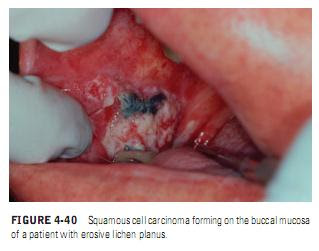Lesions of chronic or aggressive recurrent HSV may occur on the lips or intraoral mucosa. Schneidman and colleagues reviewed 18 cases of chronic herpes infection; 7 cases occurred in renal transplant patients, and 8 occurred in patients with
hematologic malignancies. Fourteen of the 18 patients had oral or perioral lesions. Greenberg and colleagues studied 98 immunosuppressed patients: 68 renal transplant patients and 30 acute leukemic patients receiving chemotherapy.
Fifty percent of the leukemic patients and 15% of the transplant patients developed aggressive or chronic recurrent HSV. HSV was the most common cause of oral lesions in both groups, producing lesions that were previously thought to be due to the toxic effects of chemotherapy or bacterial infection. The oral lesions may be small, round, symmetric, and associated with recurrent herpes infection, or they may be large and deep and often confused with lesions of other diseases (see Figure 4-41, A and B) The lesions last from weeks to months and may reach several centimeters in diameter. The larger lesions often have raised white borders composed of small vesicles (Figure 4-42).
DIAGNOSIS
HSV must be ruled out whenever oral mucosal vesicles or ulcers occur in immunosuppressed or myelosuppressed patients. Both a cytology for staining with fluorescent HSV antibody and a viral culture should be obtained. If these lesions occur in a patient without an obvious known cause, they should be thoroughly evaluated for an immunologic deficiency disease.
TREATMENT
Immunosuppressed patients with HSV infection respond well to acyclovir administered orally or intravenously.
Occasional cases of acyclovir-resistant HSV have been reported in AIDS patients. Foscarnet has been effective therapy for these patients.
Fifty percent of the leukemic patients and 15% of the transplant patients developed aggressive or chronic recurrent HSV. HSV was the most common cause of oral lesions in both groups, producing lesions that were previously thought to be due to the toxic effects of chemotherapy or bacterial infection. The oral lesions may be small, round, symmetric, and associated with recurrent herpes infection, or they may be large and deep and often confused with lesions of other diseases (see Figure 4-41, A and B) The lesions last from weeks to months and may reach several centimeters in diameter. The larger lesions often have raised white borders composed of small vesicles (Figure 4-42).
DIAGNOSIS
HSV must be ruled out whenever oral mucosal vesicles or ulcers occur in immunosuppressed or myelosuppressed patients. Both a cytology for staining with fluorescent HSV antibody and a viral culture should be obtained. If these lesions occur in a patient without an obvious known cause, they should be thoroughly evaluated for an immunologic deficiency disease.
TREATMENT
Immunosuppressed patients with HSV infection respond well to acyclovir administered orally or intravenously.
Occasional cases of acyclovir-resistant HSV have been reported in AIDS patients. Foscarnet has been effective therapy for these patients.
